GitLab is one of the most popular open-source code repositories on the market today. The tool is used by thousands of companies and developers for all stages of the DevOps lifecycle to enable product development, security, and operations teams to work on the same project seamlessly. GitLab provides Git repository management, activity feeds, issue tracking, and wikis and offers built-in Continuous Integration and Delivery, which sets it apart from other competing Git repository platforms. There is even a GitLab time tracking function and some GitLab project management tools that can be extremely useful for teams.
Why Use GitLab Alternatives?
However, GitLab isn’t the only good code repository out there. For example, you may need to use GitLab alternatives if you find that the platform doesn’t have the tools you require. Alternatively, you may find that some GitLab alternatives have better user interfaces than make more sense to you personally. The platform has a wide selection of features, and, as a result, navigating the platform can be a learning curve—you may decide that another platform is preferable because it is simply easier to use.
Also, some GitLab alternatives provide a better range of time tracking integrations or functions and it’s worth checking them out for this purpose! Without further ado, let’s look into the 12 best GitLab alternatives available to use today.
12 Best GitLab Alternatives and GitLab Competitors
GitHub
GitHub is an excellent alternative to GitLab as it prioritizes speed. For example, GitHub advocates merging new branches with the master branch, allowing you to restore old versions quickly if things go wrong.
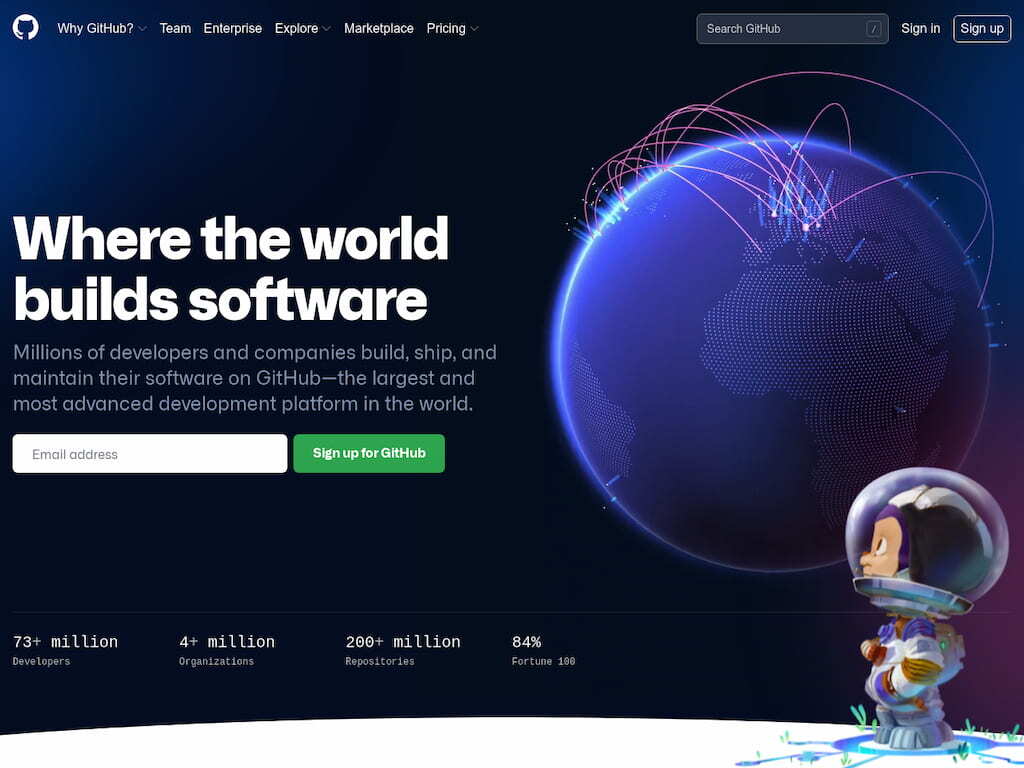
💡 Key features
GitHub facilitates easy project management and provides safety with packages. Additionally, pull requests help users to review and develop new code, and team members can discuss proposals and implementations before amending source code. As of 2022, there are 83 million developers and over 200 million repositories on the platform!
👍 Standout features
One of the best features of GitHub is automation. Unlike some other GitHub alternatives, the platform allows organizations to standardize best practices, compliance, and security, ensuring everyone is on the same page.
🤼 Collaboration features
GitHub allows for collaborative coding. Users can contribute to projects quickly thanks to the platform’s automatic environment setup, enabling them to build communities around code.
🔁 Integrations
Users can integrate GitHub with hundreds of other apps to build on your workflow, including GitHub time trackers, Slack, Asana, Microsoft Teams, and ClickUp.
🔢 Number of users
As of 2022, GitHub has 83 million users.
💰 Pricing
GitHub offers a basic free plan, a Team plan for advanced collaboration for $44 per user per year for the first 12 months, and an Enterprise plan for security, compliance, and flexible deployment for $231 per user per year for the first 12 months.
Bitbucket
Bitbucket is a Git repository management platform designed for teams. The platform provides a central location to manage Git repositories and allows users to collaborate on code and progress through the development process seamlessly. Bitbucket is a great alternative to GitLab if you’re a Jira user.
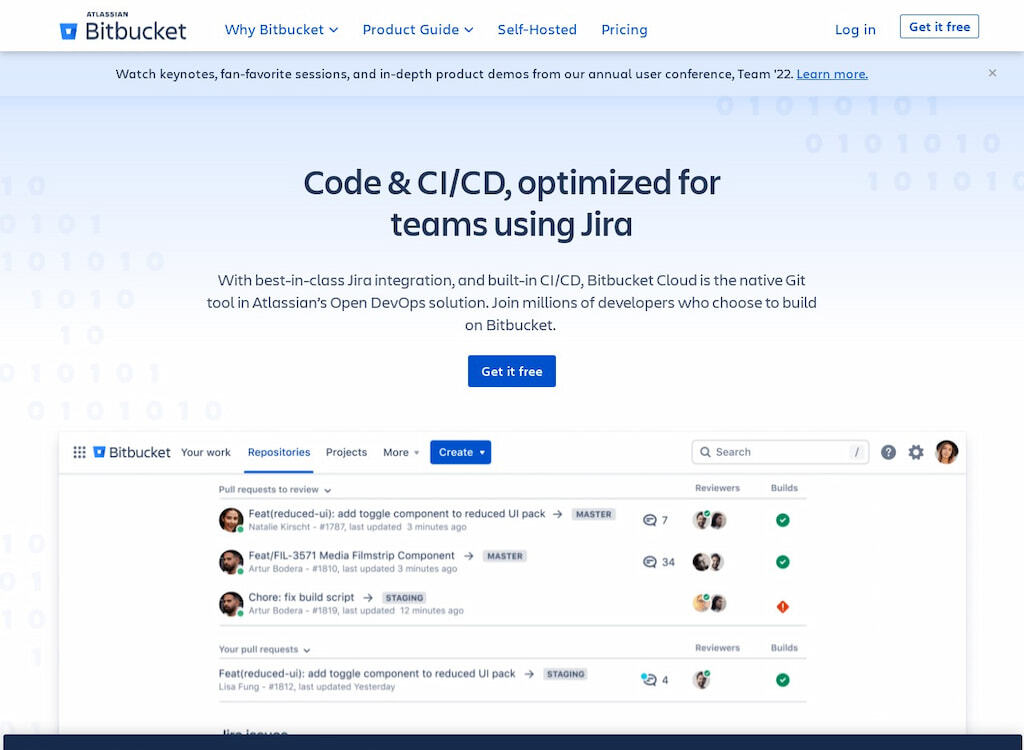
💡 Key features
Bitbucket’s key features include access control, allowing users to restrict access to code, branch permissions to enforce specific workflows to prevent problems from occurring, and in-line commenting on pull requests for collaboration on reviewing code.
👍 Standout features
Bitbucket works best when integrated with Jira, an issue tracking platform. Through integration, Jira users can release 14 percent more often with Bitbucket, as the two platforms are seamlessly integrated—create Bitbucket branches inside Jira or address issues without leaving Bitbucket.
🤼 Collaboration features
Bitbucket allows users to collaborate with IT Ops seamlessly by streamlining change management. Users can benefit from automated change approval processes, allowing them to resolve problems quickly by mapping specific incidents to selected deployments using Bitbucket and Jira Service Management.
🔁 Integrations
Bitbucket allows you to build a DevOps toolchain that works for you, as you can integrate with other software, including time tracking, test management, and IT service management apps.
🔢 Number of users
BitBucket has over 10 million users.
💰 Pricing
Bitbucket offers three plans: Free, Standard, and Premium. The Free plan includes up to 5 users, the Standard plan starts at $3 per user per month, and the Premium plan starts at $6 per user per month.
Gogs
Gogs is an open-source, self-hosted Git service that is easy to install can be used on several platforms such as Windows, Mac, and Linux, and has low system requirements.
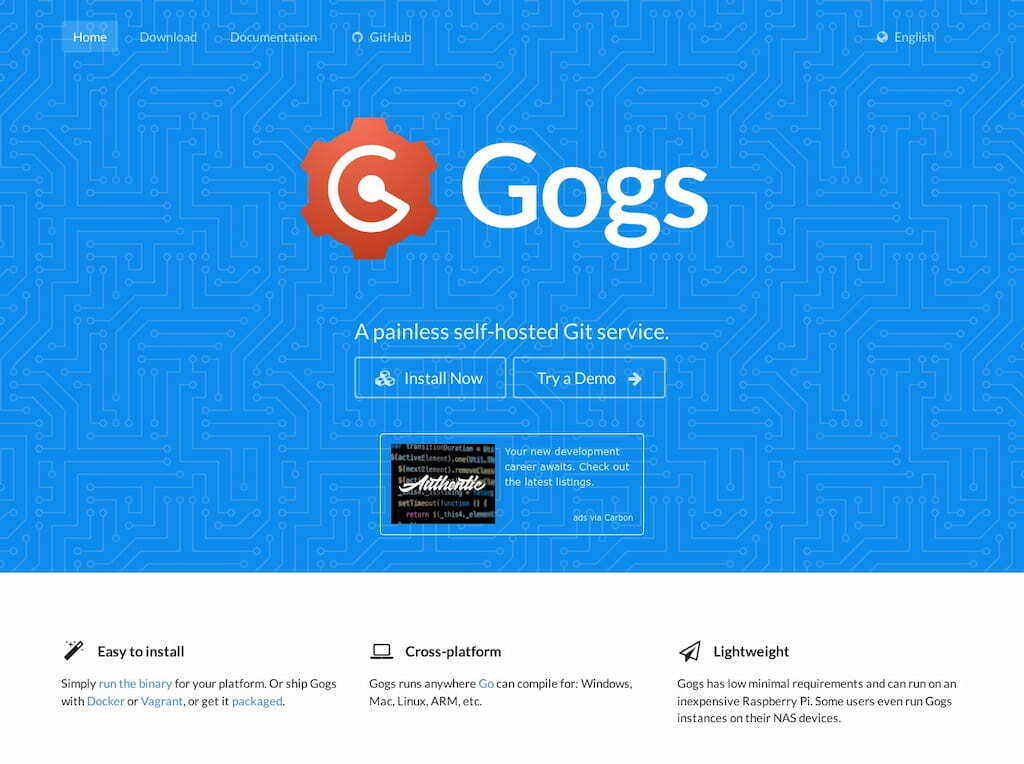
💡 Key features
Gogs has a similar interface to GitHub and supports pull and merge requests, bug tracking, and wiki documentation.
👍 Standout features
Gog is easy to install and has a simple user interface, making it less of a learning curve than platforms such as GitLab. The platform is ‘painless’ compared to other Git repositories that aren’t as intuitive in their user interfaces.
🤼 Collaboration features
Gogs allows teams to collaborate on the same project and share data easily to ensure issues are resolved quickly.
💰 Pricing
Gogs is an open-source Git repository, meaning it’s free to use for all.
Gitea
Gitea is an open-source, community-managed code-hosting platform written in Go that operates on several platforms such as Windows, Linux, MacOS, and ARM.
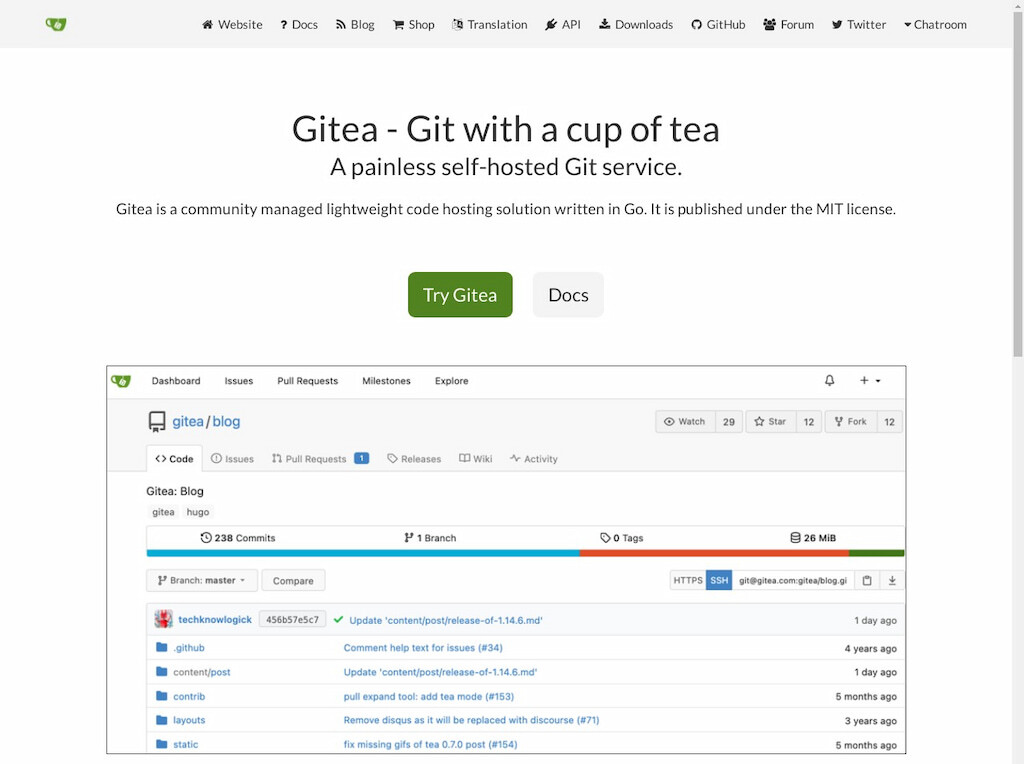
💡 Key features
Gitea may be preferable to GitLab because it is easier to install, has low minimum system requirements, and is open source. In addition, it has a host of useful features, such as multiple database support, an easy upgrade process, integrated Git-powered wikis, external Git mirroring, third-party render tool support, and more.
👍 Standout features
Gitea consumes much less memory than GitLab and is a less expensive way to get started with Git platforms.
🤼 Collaboration features
Gitea enables teams to collaborate on code review, bug tracking, pull requests, and wikis.
🔁 Integrations
Gitea can be integrated with dozens of third-party applications, such as bots, command-line apps, DevOps platforms, mobile clients, python scripts, and other plugins.
💰 Pricing
Gitea is free because it is an open-source platform funded by donations.
Azure DevOps
Azure DevOps is Microsoft’s collaborative software development tool that comes in two forms: Azure DevOps Server and Azure DevOps Services. The former is a version control system with an on-premises offering, and the latter is a cloud offering that provides a reliable, scalable, and monitored hosted service.
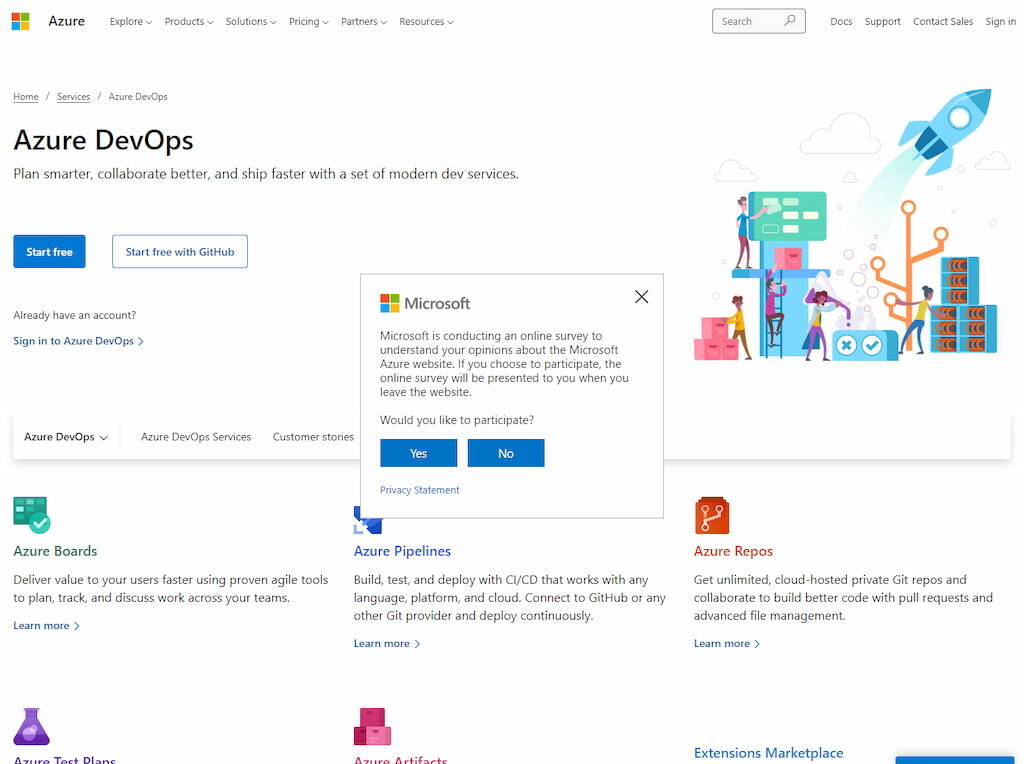
💡 Key features
Azure DevOps offers several useful features, including boards to plan, track, and discuss work, pipelines to build, test and deploy, repos to get unlimited cloud-hosted Git repositories, and test plans to test and ship with complete confidence.
👍 Standout features
Azure DevOps’ standout feature is artifacts, a feature that allows users to create, host, and share packages with team members and add artifacts to pipelines in one click.
🤼 Collaboration features
Azure DevOps offers several collaboration features, including repos, which enables teams to build better code with advanced file management and pull requests.
🔁 Integrations
Users can integrate Azure DevOps with third-party tools to create a seamless workflow, such as Jenkins, Ansible, Chef, Terraform, and Puppet.
💰 Pricing
The Azure DevOps Basic plan is free for five users, then $6 per user per month. The plan includes Azure Pipelines, Boards, Repos, and Artifacts. Alternatively, the Basic and Test plans cost $52 per user per month and include all Basic plan features as well as test planning, tracking and execution, browser-based tests and annotation, rich-client test execution, centralized reporting, and user acceptance testing.
Salt
Salt is a Python-based open-source software that supports several platforms, including Windows, Mac, and Linux. It offers a new approach to infrastructure management and has a user-friendly interface.

💡 Key features
Salt provides remote execution, configuration management, and event-driven infrastructure that drives reactive provisioning, management, and configuration across all infrastructure systems.
👍 Standout features
Salt’s standout feature is remote execution, which provides functionality such as installing packages, running remote commands, transferring files, and restarting services to save teams time.
🤼 Collaboration features
Salt doesn’t offer as many collaboration features as other platforms in this guide. However, the platform is ideal if you need a flexible infrastructure management solution.
🔁 Integrations
Users can integrate Salt with several useful applications, such as Device42, Docker, GitHub, AWS, Azure, and Jenkins.
💰 Pricing
Salt offers a free open-source version of the software. However, an Enterprise subscription costs $150 per machine per year.
Buddy
Buddy is a web-based Continuous Integration and Delivery software used to build, test and deploy applications. The software comes with over 100 built-in actions that allow you to speed things up in the pipeline in just a few clicks—these actions can be used to create websites and generate static sites.
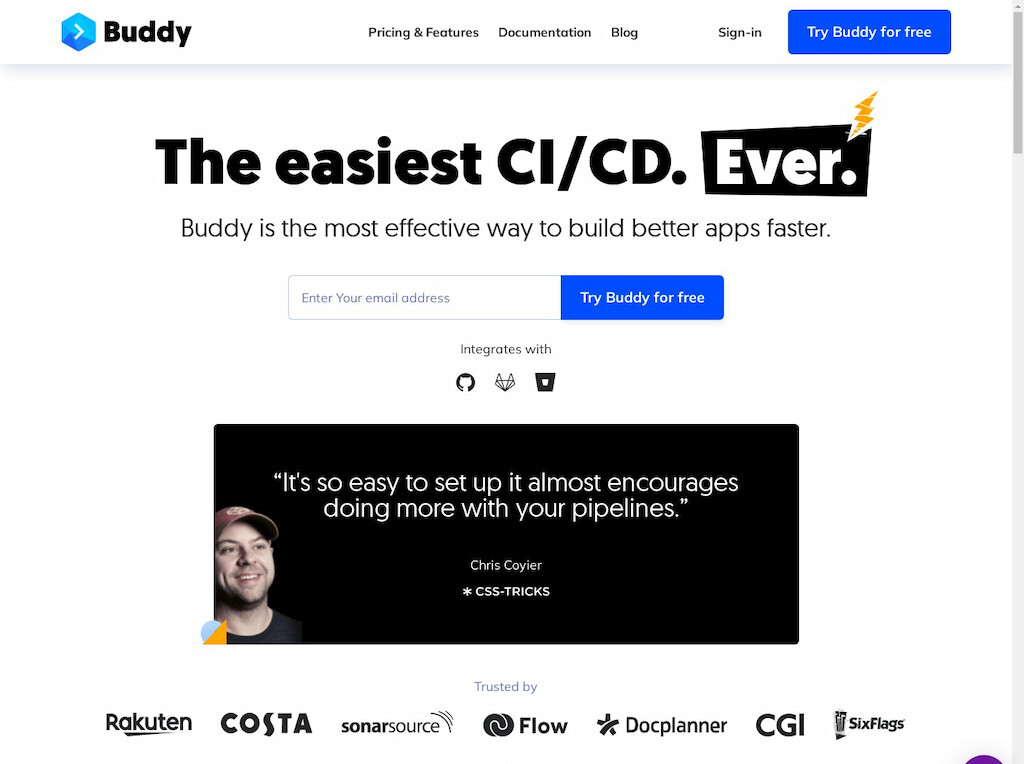
💡 Key features
Buddy offers a host of valuable features, including docker layer caching, concurrent pipelines and steps, reusable environments, repository caching, artifacts caching, and changeset-based deployments.
👍 Standout features
Buddy’s standout feature is speed. The platform provides an 87 percent faster Continuous Integration and Delivery adaption time by teams, and the average deployment time is just 12 seconds.
🤼 Collaboration features
Buddy allows users to collaborate on and assign projects to ensure no task is missed. You can divide teams into groups for easier identification, for example, front-end, back-end, marketing, support, and so on. Buddy doesn’t require advanced DevOps experience, so other members of your team can use the platform to collaborate on projects.
🔁 Integrations
Users can integrate Buddy with various platforms, including GitHub, Slack, Bitbucket, GitLab, and Google Cloud. Furthermore, the application runs builds in customizable containers, offering you over 20 environments in the most popular languages and frameworks, such as Java, Python, PHP, and Android.
💰 Pricing
Buddy offers a Free, Pro, Hyper, and On-premises plan. The Pro plan starts at $75 per month and includes 20 projects and unlimited pipeline runs. The Hyper plan starts at $200 per month and includes unlimited projects and pipeline runs. The On-premises plan costs $35 per month per user and includes all Hyper features, as well as custom resources and worker support.
LaunchPad
Launchpad is a web-based software collaboration platform that enables users to develop open-source software.
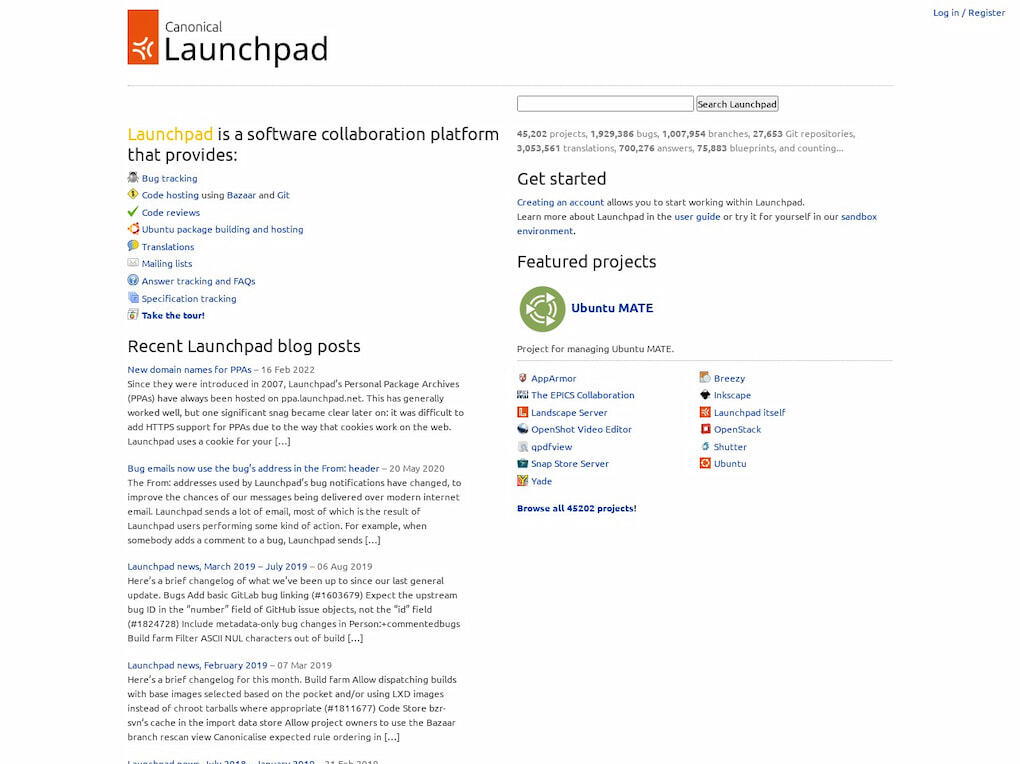
💡 Key features
With Launchpad, you can track bugs, host code using Bazaar and Git, support mailing lists, do code reviews and build and host Ubuntu packages. Don’t be put off by the slightly aged user interface; the platform is a great alternative to GitLab, especially if you’re a Ubuntu user.
👍 Standout features
The platform has many Ubuntu-targeted projects, meaning it’s perfect for Ubuntu users. However, it also supports Git, Bazaar, and Mercurial on various operating systems.
🤼 Collaboration features
With Launchpad, you can collaborate with others in your field by contributing to some of the 44,000 projects on the platform. You can either join an existing development team or create and run projects yourself.
💰 Pricing
Launchpad is free to use. All you need to do to access the platform’s features is sign up and create a Launchpad account.
SourceForge
SourceForge is a web-based source code repository and is an excellent alternative to GitLab because it is free to open-source projects. The platform takes a centralized approach to give developers more control over the software.
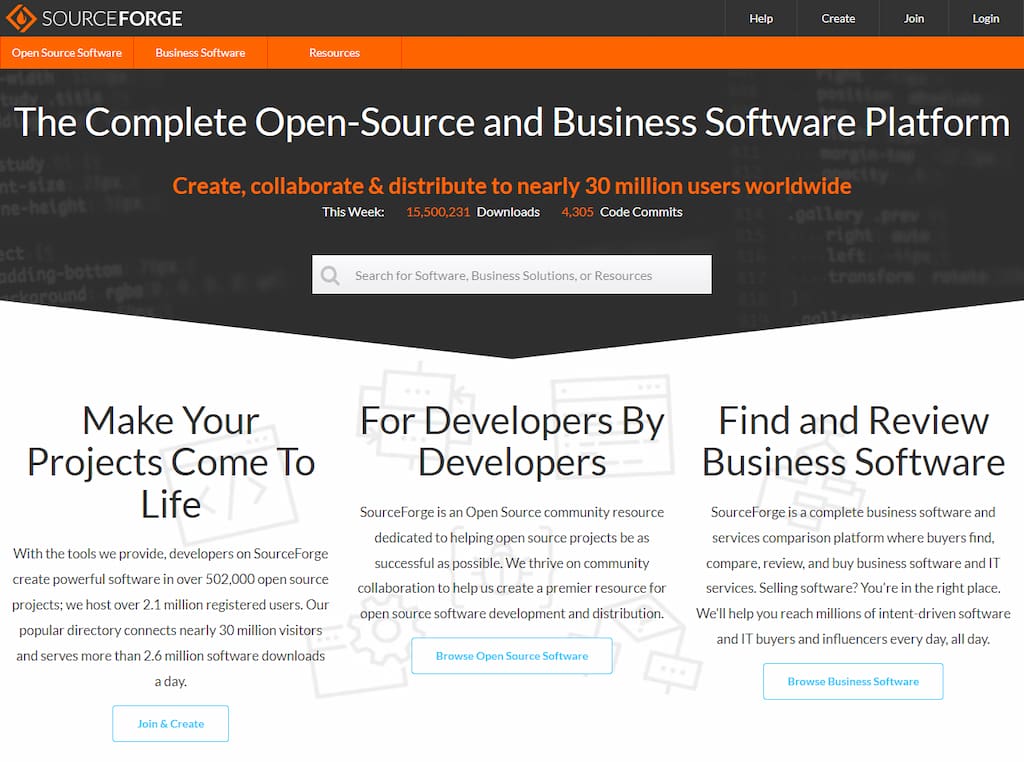
💡 Key features
SourceForge offers several useful features, such as bug tracking, wiki documentation, user support forums and reviews, developer and user mailing lists, and a micro-blog for project updates.
👍 Standout features
One of SourceForge’s standout features is that you can use it for revision control systems, including Bazaar, Mercurial, SVN, and CVS.
🤼 Collaboration features
SourceForge doesn’t offer as many collaboration features as GitLab. However, it does redeem itself by being open-source.
💰 Pricing
SourceForge is free to use for open-source projects.
RhodeCode
RhodeCode is an open-source platform for source code management, providing centralized control for distributed repositories, including Mercurial, Git, and Subversion.
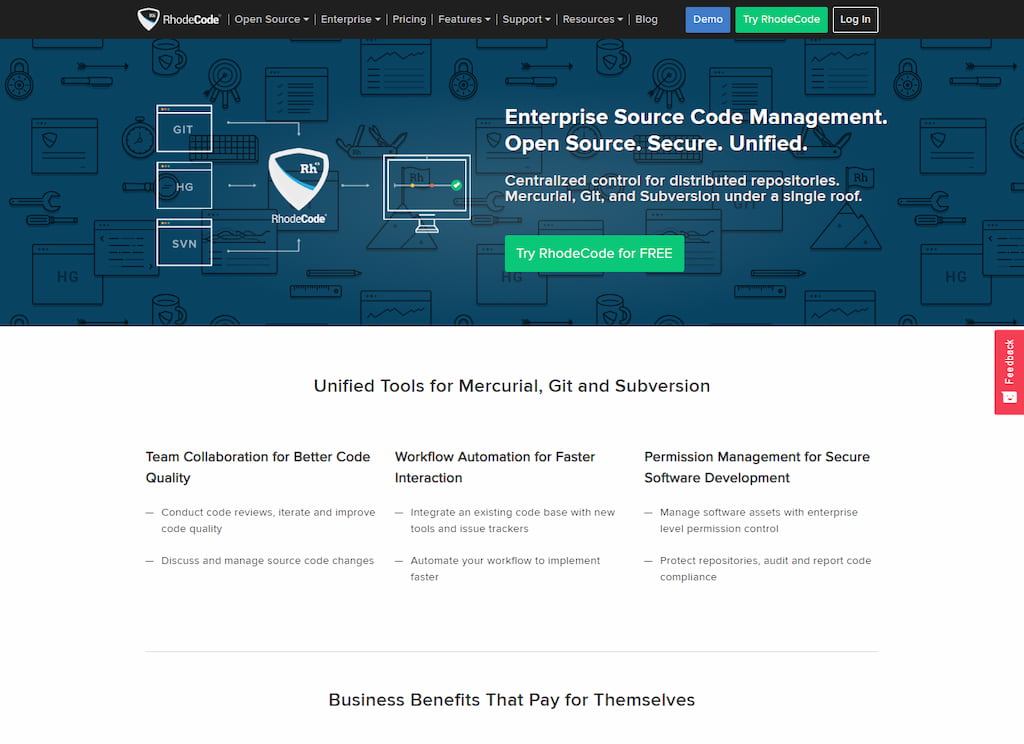
💡 Key features
RhodeCode has several valuable features, including workflow automation for faster interaction and permission management for secure software development. Users feel protected by military-grade security and have access to the tools to code faster, test more, and reduce bugs in software.
👍 Standout features
RhodeCode’s standout feature is unified collaboration across Git, Subversion, and Mercurial. Users can conduct code reviews across all repositories, allowing them to create common workflows that meet their team’s needs.
🤼 Collaboration features
RhodeCode allows teams to collaborate with the goal of creating better code. On the platform, users can conduct code reviews, improve code quality and discuss and manage source code changes as a team.
🔁 Integrations
To streamline workflows, you can integrate RhodeCode with useful tools Continous Integration and project management tools such as Jenkins, Jira, Trello, GitHub, Bitbucket, and Slack.
💰 Pricing
RhodeCode offers several pricing plans: RhodeCode Community, Enterprise, and Cloud. RhodeCode Community is free to use and enables users to deploy on-premises, use code review tools, and more. The Enterprise plan costs $75 per user per year with a minimum of 10 users and includes instant code reviews, scalable code search across repositories, high scalability, and more. RhodeCode Cloud starts at $8 per month per user for a minimum of 10 users and includes all RhodeCode Enterprise features as well as 3 hardware tiers to choose from, a dedicated domain, unlimited traffic, repository size, and disk space.
Harness
Harness is a software delivery platform designed to provide a seamless delivery experience for developers, allowing them to choose the modules to suit their specific needs.
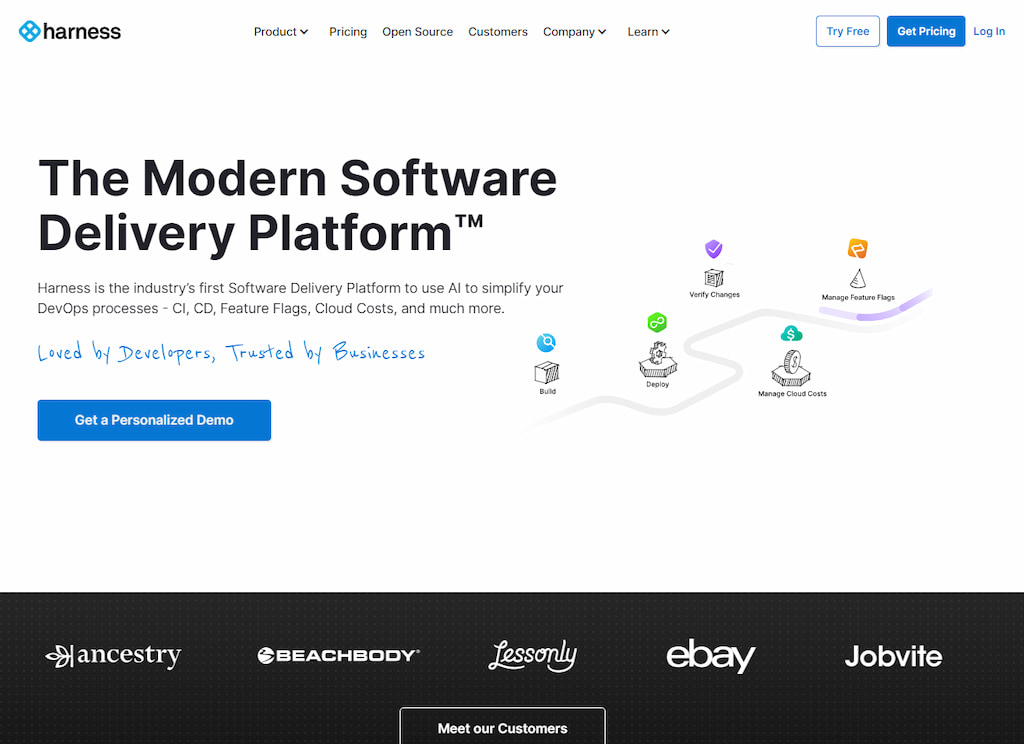
💡 Key features
With Harness, developers can build and deploy software, verify changes to software, and manage cloud costs and feature flags.
👍 Standout features
The standout feature of Harness is how seamless the platform is for developers. There is one pipeline containing Continous Integration, Continous Development, cloud costs, infrastructure as code, and change tracking.
🤼 Collaboration features
The platform’s unified pipeline makes it easier for development teams to collaborate on projects, ensuring that everyone is on the same page.
🔁 Integrations
To supercharge project collaboration, you can integrate Harness with several other project tracking and automation apps, such as Jira and Zapier.
💰 Pricing
Harness offers a Free plan, which allows users to deploy up to five services, build Continous Development pipelines, and more. The Team plan costs $100 per service per month and allows users all the benefits of the free plan as well as the ability to deploy up to 100 services and make use of external integrations. Finally, the price of an Enterprise plan varies depending on organizational requirements.
Jenkins
Jenkins is an open-source automation server. It provides hundreds of plugins to support the building, deployment, and automation of code.
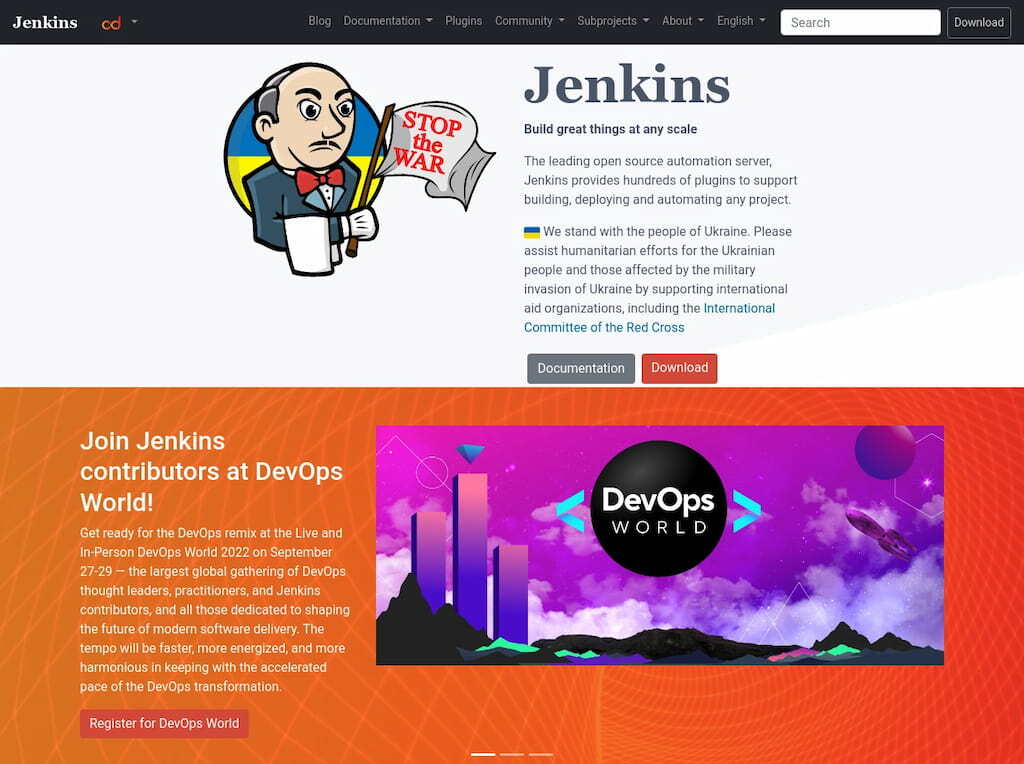
💡 Key features
Jenkins is a Continous Integration and Continuous Delivery platform which is easy to install and easy to configure. The platform increases code coverage and ensures that code is well tested before it goes live.
👍 Standout features
Jenkins standout feature is that it is easy to install and configure. The self-contained Java-based application is ready to run on Windows, Mac OS, and many other operating systems.
🤼 Collaboration features
Jenkins has collaboration features built into the application. For example, you can start a job based on a change in a repo and share the successful completion of jobs to trigger new jobs. The platform’s collaboration features make sure that all development team members are in the loop.
🔁 Integrations
Improve Jenkin’s capabilities by integrating it with other automation and project management applications, such as Monday, Zapier, Slack, and many more.
💰 Pricing
Jenkins is an open-source, free-to-use tool.
GitLab Alternatives: Insights from Reddit DevOps Practitioners
As many teams grapple with the rising costs of GitLab’s premium licenses, some have turned to online forums like Reddit to explore potential alternatives. Here’s a summary of key insights and recommendations from DevOps professionals who have encountered similar challenges:
On-premises hosting solutions
- Gitea and Gogs: These open-source platforms were frequently mentioned as lightweight and cost-effective alternatives to GitLab for on-premises hosting. However, users noted that while they are well-maintained, their user experience (UX) may not be as polished as GitLab’s.
- GitHub Enterprise Server: For those seeking enterprise-scale solutions with robust support, GitHub Enterprise Server was highlighted. However, it was noted that GitHub is increasingly pushing towards cloud-based solutions, which may impact the long-term viability of on-premises options.
- OneDev: This lesser-known platform offers features like custom fields, multiple assignees per issue, and a hierarchical project structure. It’s designed for ease of maintenance and self-hosting, with built-in CI/CD capabilities that rival GitLab’s.
Cloud-based alternatives
- Azure DevOps: While Azure DevOps was recognized as a strong product with extensive features, some users expressed concerns about Microsoft’s focus shifting towards GitHub after its acquisition, potentially impacting future support for Azure DevOps.
- Harness Gitness: A new entrant, Gitness from Harness, was mentioned as a promising open-source alternative. However, as it’s relatively new, feedback on its effectiveness and reliability is still emerging.
Concerns and challenges
- Bitbucket: While Bitbucket was acknowledged, it generally received negative feedback, especially in comparison to GitHub and GitLab. Users found it lacking in features, particularly in larger or more complex setups.
- Migration costs: Several users emphasized the potential hidden costs of migrating from GitLab, such as setup, retraining, and potential disruptions to development workflows. These factors can sometimes outweigh the benefits of switching to a cheaper alternative.
Community edition consideration
- GitLab Community Edition: For teams primarily concerned with cost, some users suggested sticking with GitLab’s Community Edition, which can be self-hosted without the associated premium license fees. This allows teams to maintain familiarity with the platform while avoiding increased costs.
These insights highlight a range of alternatives to GitLab, each with its own set of strengths and weaknesses. Teams considering a switch should weigh the long-term implications, including migration costs and the specific needs of their development and project management workflows.
TL;DR: 12 GitLab Alternatives
| Key features | Standout features | Collaboration features | Integrations | Pricing | |
| GitHub | Easy project management with reliable safey packages | Automation | Build communities around code with collaborative coding | Integrate with platforms such as Slack, Asana, Microsoft Teams and more | Free plan available, Team plan for $44 per user per year for first 12 months |
| Bitbucket | Access control, branch permissions, in-line commenting on pull requests | Integration with Jira | Streamlined change management processes | Integrate with time tracking, test management and IT service management apps | Free plan available, standard plan for 5 users starts at $5 per user per month, Premium $6 per user per month |
| Gogs | Supports pull and merge requests | Simple user interface | Data sharing capabilities to solve issues | N/A | Free to use |
| Gitea | Easy to install, low system requirements, open-source | Consumes less memory than GitLab | Collaborate on code review, bug tracking, pull requests and wikis | Integrate with bots, command-line apps, DevOps platforms, mobile clients and python scripts | Free to use |
| Azure DevOps | Boards to plan, track and discuss, pipelines to build test and deploy | Artifacts to create, host and share packages | Collaborate on repos to build better code | Integrate with platforms such as Jenkins, Ansible, Chef, Terraform and Puppe | Free plan available, paid plan starts at $6 per user per month |
| Salt | Remote execution, configuration management and event-driven infrastructure | Remote execution | Flexible infrastructure management application for teams | Integrate with platforms such as Device42 Docker, GitHub, AWS, Azure and Jenkins | Free plan available, Enterprise plan costs $150 per machine per year |
| Buddy | Docker layer caching, concurrent pipelines and steps, reusable environments | Speed, reducing deployment time | Collaborate by assigning projects to team members | Integrate with platforms such as GitHub, Slack, Bitbucket, GitLab and Google Cloud | Free plan available, Hyper plan costs $75 per month, On-premises plan costs $35 per user per month | LaunchPad | Track bugs, host code using Bazaar and Git, support mailing lists, do code reviews | Ubuntu-targeted projects | Contribute to some of the 44,000 projects on the platform | N/A | Free to use |
| SourceForge | Bug tracking, wiki documentation, user support forums, developer and user mailing lists | Revision control systems, including Bazaar, Mercurial, SVN and CVS | N/A | N/A | Free to use |
| RhodeCode | Workflow automation, permission management, and military grade security | Unified collaboration across Git, Subversion, and Mercurial | Conduct code reviews, improve code quality and discuss and manage source code changes as a team | Integrate with platforms such as Jenkins, Jira, Trello, GitHub, Bitbucket, and Slack | Free plan available, Enterprise plan costs $75 per user per year with a minimum of 10 users, Cloud starts at $8 per month per user for 10 users |
| Harness | Build and deploy software, verify changes, and manage cloud costs and feature flags | Seamless platform for developers | Unified pipeline for multiple developers | Integrate with platforms such as Jira and Zapier | Free plan available, Team plan costs $100 per service per month, Enterprise plan varies by organizational needs |
| Jenkins | Easy to install and configure, increases code coverage, ensures code is well-tested before launch | Easy to get started | Start jobs based on changes in repos, share successful jobs to trigger new jobs | Integrate with platforms such as Monday, Zapier and Slack | Free to use |
GitLab Alternatives: Final Thoughts
GitLab is one of the most popular code repositories for developers today, with 30 million users and counting. However, it might not be the best option for everyone. For example, many will choose to use GitHub instead of GitLab, as GitHub is generally more user-friendly. However, you may find that a different platform altogether is best suited to your needs.
If you’re looking for GitLab alternatives to improve productivity and efficiency, consider integrating your chosen Git repository platform with a time tracking app. You can add time-tracking and team management capabilities to GitLab and other GitLab competitors by integrating with a time tracker that offers useful features such as a time clock app, timesheet app, work hours tracker, and an attendance tracker. Integrating Git repository platforms with applications such as Everhour, TMetric or TimeCamp means that employee time tracking is easier than ever!
We also suggest you go through our elaborate GitLab tutorial where we explain the GitLab basics.

